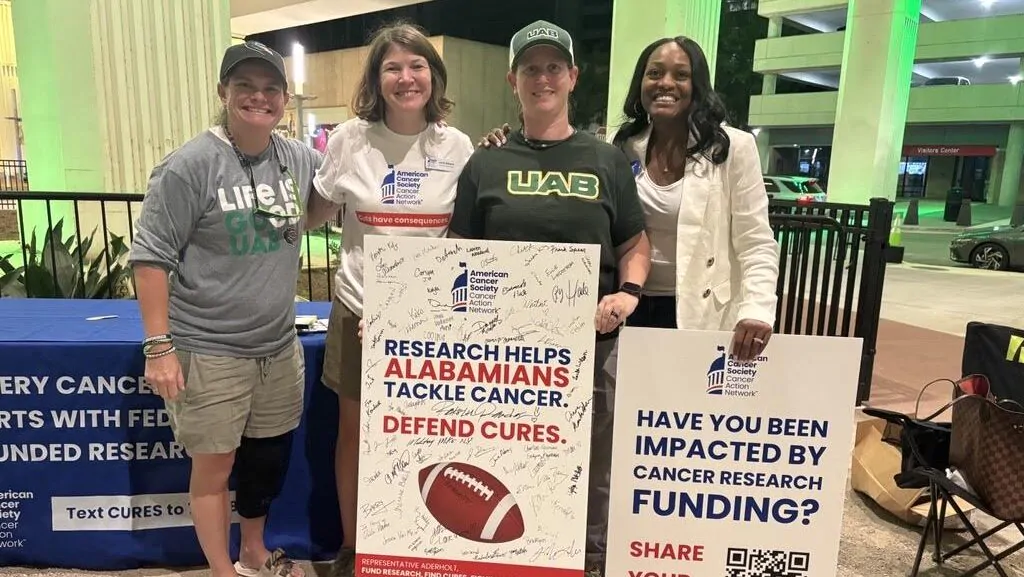With the introduction of the U.S. House’s 2026 health appropriations bill, Alabama’s federal lawmakers and cancer research advocates are continuing their work to shape the future of federal cancer research and prevention funding.
On Monday, the U.S. House Committee on Appropriations released its version of the FY26 Labor, Health and Human Services, Education, and Related Agencies Bill, which funds agencies such as the National Institutes of Health and the Centers for Disease Control.
The bill received a favorable review from the Health and Human Services, Education, and Related Agencies Subcommittee, chaired by U.S. Representative Robert Aderholt, R-Ala., on Tuesday evening. It will now advance to the full appropriations committee.
While the House version of the bill contains a funding increase for NIH’s National Cancer Institute, it also plans to cut NIH’s overall budget by roughly one percent. The bill includes cuts to CDC cancer prevention programs as well.
The House committee suggested an overall 2026 budget of $47.8 billion for NIH, which is $456 million less than its 2025 funding level. However, the House committee’s proposal would grant NIH’s National Cancer Institute $7.3 billion for FY26, an increase of $48 million from its 2025 funding levels.
The House version of the bill follows the Senate Committee on Appropriations request for $48.7 billion for NIH in late July, a $400 million boost to the agency’s overall 2025 budget, which would include a $150 million increase in cancer research funding.
The Senate committee’s proposal marked a break from recommendations made by the White House Office of Management and Budget, which proposed a $27.9 billion annual budget for NIH in May. OMB also recommended a budgetary rollback of 37 percent for NCI, calling for the agency to receive $4.5 billion in FY26.
Ahead of the subcommittee markup Tuesday, Aderholt showed support for the House’s appropriations bill calling for reductions in spending, while also emphasizing the importance of the legislation’s healthcare, education and labor initiatives.
“This subcommittee is responsible for the largest non-defense expenditure in the federal government,” Aderholt said in a written statement ahead of the subcommittee meeting. “Therefore, it presents one of the greatest opportunities for us to reevaluate our spending priorities to ensure taxpayer dollars are being spent responsibly, in order to provide for critical services in healthcare, workforce development, and education—all while eliminating waste and cutting out politically motivated programs being pushed by non-elected bureaucrats.”
“The bill before you today balances the need for responsible fiscal stewardship, while maintaining key investments in biomedical research, schools and public health,” Aderholt said during the subcommittee meeting. “Following the president’s direction, we have taken a critical look at every program and in several cases had to make some hard decisions.”
Meanwhile, the subcommittee’s ranking member, Representative Rosa DeLauro, D-Connecticut, and her Democrat colleagues, have criticized committee Republicans for the appropriations bill draft, which minority subcommittee members described as an “assault on public education and research into lifesaving cures.”
“Following President Trump’s lead, House Republicans want to make health care less affordable and slash research into lifesaving cures. Republicans are proposing cutting funding for the National Institutes of Health and the Centers for Disease Control and Prevention,” DeLauro said in a written statement.
The bill was favorably reported along party lines to the appropriations committee, 11-7.
The American Cancer Society Cancer Action Network has been part of the nationwide push against the cuts proposed in May by the Trump administration’s OMB.
Ahead of the subcommittee meeting, Government Relations Director for ACS CAN Alabama Jane Adams told APR, although her organization was pleased that the House is also pushing for the expansion of NCI’s budget, proposed cuts to the CDC’s cancer prevention programs have raised concerns at ACS CAN.
“We’re pleased to see comparable numbers from the Senate when it comes to NIH and National Cancer Institute funding. That is good and I think our advocacy is making a difference,” Adams said.
“Cancer research is really important, but prevention is really key. Specifically, in Alabama where you have high rates of breast and cervical cancer, especially in rural communities. A lot of funding that comes into Alabama for breast and cervical cancer screenings, early detection screening, it’s from that CDC funding,” she added.
The House version of the appropriations bill would grant the CDC $7.4 billion for FY26, marking a $1.7 billion cut to its 2025 funding. These cuts would eliminate funding for tobacco prevention and control, as well as the agency’s Preventative Health and Health Services Block Grant.
Dr. Ankur Saxena, a pediatric cancer researcher at the University of Alabama at Birmingham, said while he was pleased with the Senate’s version of the appropriations bill, he remains concerned with the overall cut to NIH and CDC funding presented in the House.
“There’s definitely still reason for concern. I think, you know, big picture, it’s important to remember that this is, this is not where we should be,” Saxena said. “If somebody gave you a bunch of food and then took some of it away and you still have some food, that’s better than not having any, but it’s certainly not as good as having what you need.”
“There have been ups and downs, and, you know, I’m cautiously optimistic based on what the Senate put forward, and cautiously, cautiously optimistic about what the House is going to do,” Saxena added.
Adams said she has remained confident that her organization’s advocacy has and will continue to reach Alabama’s federal lawmakers, citing shows of support for NIH funding made by Senator Katie Britt, R-Ala.
She also expressed optimism regarding ACS CAN’s conversations with Aderholt’s office as well as fellow appropriations committee member Representative Dale Strong, R-Ala., and the congressmen’s willingness to help promote strong investments in NIH and NCI research funding.
“We have strong volunteers and advocates in both of those congressional districts, and they’ve met with those members of Congress, both Congressman Aderholt and Congressman Strong, about this issue and they listened very carefully,” Adams explained. “You know, members of Congress don’t tell you what they’re gonna do, but we feel a general sense of overall support from the delegation.”
Alongside the organization’s recent advocacy seeking to garner support for cancer prevention and research funding increases among Alabama’s federal delegation, Adams pointed to ACS CAN’s recent and upcoming on-the-ground initiatives aimed at rallying Alabama’s medical researchers and citizens around the issue—including a tailgate held by ACS CAN at the University of Alabama at Birmingham’s first football game of the season last Thursday.
“Ever since the proposed cuts came down, ACS CAN has kicked into high gear with our partners and really tried to create a space for researchers and people who are impacted by cancer in Alabama to engage in advocacy,” said Adams.
“We want there to be general awareness. This is something that is not a political issue. It’s really about health care and jobs and the economy, and that affects every single one of us,” said regarding the goals of the tailgate event.
As well as giving researchers a space to advocate for cancer research and prevention funding, Adams said she was glad the tailgate was able to raise awareness for threats to funding among UAB students.
“A lot of the students that came up had no clue about, you know, the proposed cut to cancer research, proposed cut to cancer prevention,” Adams said. “And when they found out about it, they were like, ‘Oh, my mom has cancer right now,’ you know, and wanted to engage and sign up. And so, again, it just shows how much support there is for this funding.”
Saxena similarly said he felt one of the event’s successes was the amount of young people it attracted and was able to involve regarding issues facing cancer research and prevention funding.
“It really is an opportunity to reach out to the younger generation that, you know, perhaps, aren’t thinking as actively about things like cancer and chronic diseases,” he said.
“So, it’s great to be able to get young people aware of these things and sort of prepared for what they’re going to be dealing with, with family, friends and loved ones,” Saxena added.
Invitations to the event were also sent to each member of Alabama’s congressional delegation. Staff members from the offices of U.S. Representative Terri Sewell, D-Ala., and Birmingham Mayor Randall Woodfin attended.
ACS CAN was also recently responsible for an advertising campaign that placed billboards off Interstate 65 in the Montgomery and Birmingham areas, calling on Congress to protect federal cancer research funding.
The billboards are part of a nationwide campaign led by the organization. Billboards were also placed in Tennessee, Oklahoma and Louisiana during August.
Speaking on her organization’s next steps in their fight to promote “robust” funding for cancer research and prevention, Adams said ACS CAN is currently planning a trip to Washington to meet with Alabama’s state and federal politicians, as well as planning a potential tailgate at the University of Alabama—aimed at attracting further attention to the issue from Alabama politicians.
“We’re gonna keep up the momentum, you know. We have people, you know, who benefited from NIH clinical trials that will be flying to D.C. next week to meet with our members of Congress,” she said. “So, we’re gonna keep on until we get to the end because although there are really good things in that budget, there are some areas that we are paying attention to.”
Saxena said he would also like to see legislators continue to build upon progress made through investments in cancer research and prevention appropriations.
“It takes a long, long time to build that up and make something really beautiful, and just a split second to knock it down and destroy it,” Saxena said. “That’s kind of where we are right now. So, I just would urge and implore [Aderholt] and all the other leaders that we have in the legislative branch, to not let this get knocked down any further.”












































